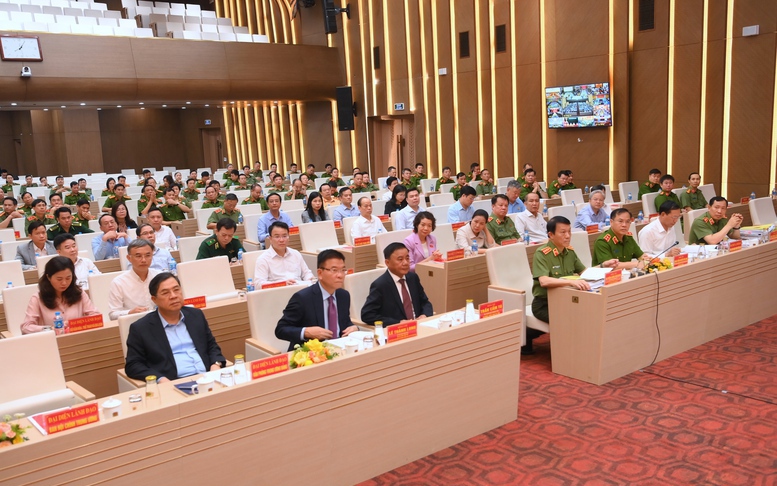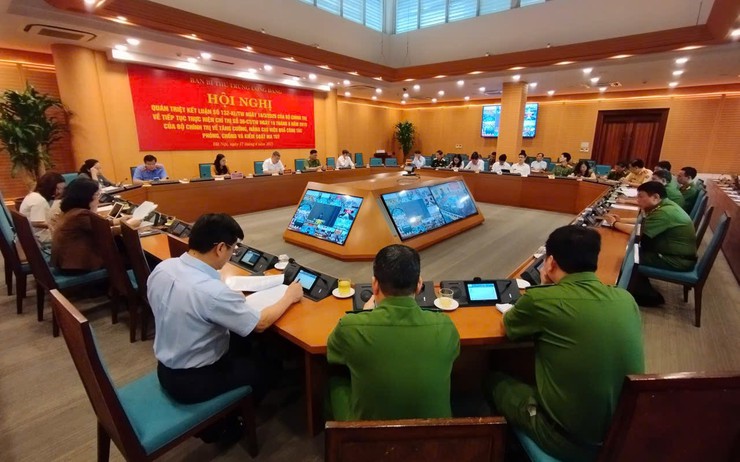The conference was held online, connecting the main hall at the Ministry of Public Security with provincial, district, and communal People's Committees across all 63 provinces and centrally-run cities. Nearly 400,000 delegates participated.

Delegates at the meeting.
At the central point at the Ministry of Public Security, attendees included Politburo Member and Permanent Member of the Party Central Committee's Secretariat Tran Cam Tu; Politburo Member and Minister of Public Security General Luong Tam Quang; and Member of the Central Party Committee and Deputy Prime Minister Le Thanh Long, who also serves as Chairman of the National Committee for AIDS, Drug, and Prostitution Prevention and Control.
At the Hanoi site, representatives from relevant departments and agencies were present.
A five-year review of the implementation of Directive No. 36-CT/TW indicated strong and effective efforts in combating drug-related crimes. Authorities detected, investigated, and arrested 122,066 cases involving 186,950 offenders. Seized assets included over 3,080 kg of heroin, 14,513.48 kg and 12,036,388 pills of synthetic drugs, and 3,244.16 kg of cannabis.
In terms of prosecution and adjudication, courts at all levels handled 112,678 drug-related cases involving 160,172 defendants.
The national police force has compiled records of 37,980 individuals using illegal drugs, 165,992 drug addicts, and 16,932 individuals post-rehabilitation.
Regarding drug rehabilitation, Vietnam currently has 97 public rehab centers, treating 41,649 people. Between 2020 and May 2024, vocational training was provided to 38,323 people undergoing rehabilitation.
Compared to the previous five-year period before the implementation of Directive No. 36-CT/TW, the number of drug-related cases and individuals arrested increased by 21.83% and 21.95%, respectively. New prosecutions rose by 32.48% in terms of cases and 39.94% in terms of defendants.
At the conference, Deputy Prime Minister Le Thanh Long highlighted the key contents of Conclusion No. 132-KL/TW and the Government's action plan for implementation.
Representatives of various ministries, sectors, and localities also delivered remarks clarifying results, solutions, and recommendations for future drug prevention efforts.

Overview of the meeting from the Hanoi side.
From Hanoi, Deputy Secretary of the Party Committee of the City People's Committee Le Quang Long reported that over the past five years, local authorities and police had detected and handled 17,891 cases involving 27,146 individuals—a respective increase of 4,377 cases and 9,701 individuals compared to the previous five-year period. Authorities seized over 3,600 kg of various narcotics, an increase of 2,600 kg.
Hanoi also noted significant success in eliminating hotspots for drug-related social evils and avoiding the emergence of publicly disruptive drug areas. The city proposed that the central government soon roll out projects under the national drug prevention program through 2030 to enable local implementation. It also called for enhanced application of science, technology, and artificial intelligence in drug prevention, and for the continued review and improvement of laws and policies related to drug control.
In his concluding remarks, Permanent Member of the Secretariat Tran Cam Tu praised the achievements over more than five years of implementing Directive No. 36-CT/TW.
Looking ahead, he urged all Party committees, agencies, units, and localities to thoroughly educate and raise awareness among staff and Party members about the vital role of drug prevention in ensuring public security, protecting health and lives, maintaining social peace and happiness, safeguarding national resources, and preserving future generations in the new era.
He emphasized the need for unified thought and determination, stating:
"Drug prevention and control must be seen as a core, urgent, regular, and long-term task that requires perseverance, determination, and high political will. It is a responsibility of the entire political system and society as a whole, and absolutely must not be left solely to the police."
He called for the implementation of synchronized solutions following the approach of reducing supply, demand, and harm. A comprehensive review of drug addicts and illegal drug users must be conducted, with eligible individuals placed under mandatory rehabilitation and educational programs. Resources for rehabilitation should be secured and its effectiveness improved. International cooperation in drug prevention must also be strengthened.
Following the conference, the Secretariat instructed Party committees in ministries, sectors, provinces, and cities to promptly disseminate and implement the content of Conclusion No. 132-KL/TW to each Party cell, all cadres, Party members, and the broader population. Specific plans and action programs must be developed based on creativity and adaptability to local conditions.
The ultimate goal is that by the end of 2030, at least 50% of commune-level administrative units nationwide will be "drug-free." Tran Cam Tu stressed, "This is a target that demands extremely high political determination and great effort from the entire political system, through the comprehensive implementation of all proposed solutions to gradually eliminate drugs from social life."